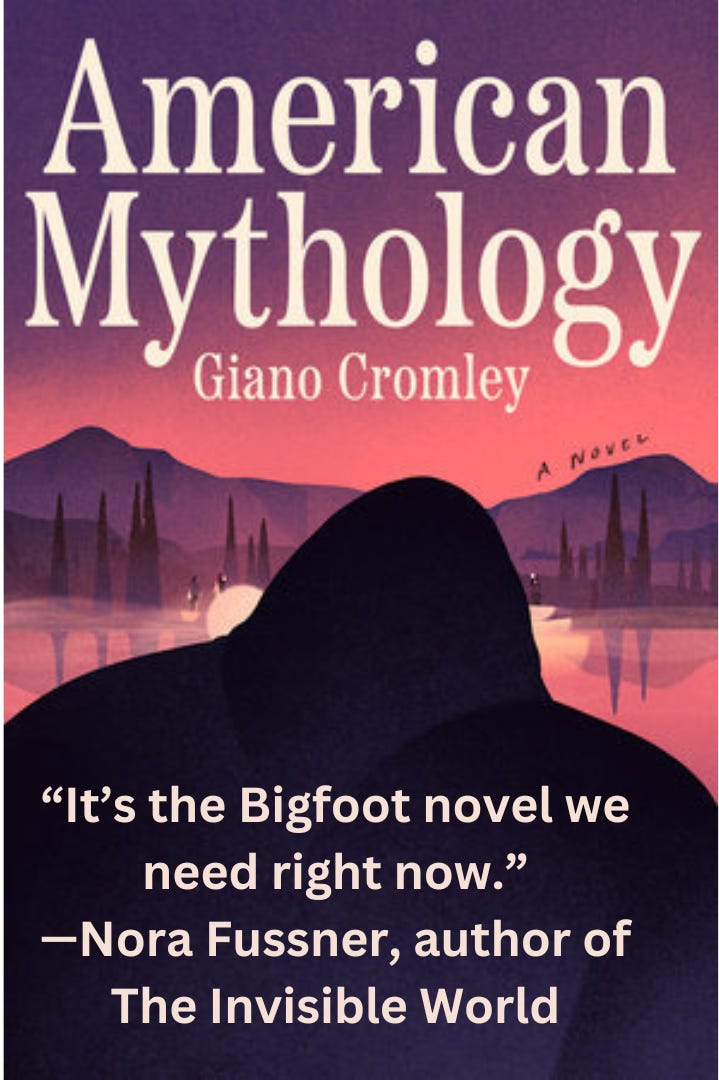Greetings Fellow Mountaineers:
It’s been a while since my last epistle, so there’s plenty of stuff to catch up on.
The big news is that American Mythology is now available for pre-order! Through the dark arts of metrics and algorithms, pre-orders go a long way toward boosting a book’s viability, so if you haven’t already, you’re welcome to order yourself a copy (or three) from wherever you buy books. It would be greatly appreciated by yours truly.
Other than that, it’s mostly been a series of ever more exacting edits on the manuscript. The level of scrutiny the copy editors have put into this endeavor has been nothing short of astonishing.
For example, a character plays a Maria Callas record and the song he hears is an aria from Madama Butterfly. Even though the record is out of print and is unavailable on streaming platforms, the copy editor managed to dig up the tracklist and noted that the first piece on the album was, in fact, an aria from Manon Lescaut. Sacré bleu!
In another case, the copy editor noted a chronogical discrepancy by breaking down the relative amounts of time it would take for one character to run a load of laundry while another one was supposed to be simultaneously cooking a scrambled egg. [Insert egg pun here1]
When confronted with these inconsistencies, there wasn’t much I could do other than throw my hands up in surrender and say: Busted. I often think of writing fiction as an act of throwing out a bunch of bullshit and seeing how much you can get away with. A good editor will reign in your bullshit to the point of plausibility. And I have to say the level of scrutiny paid to my manuscript has been both humbling and gratifying, because it shows how much all these strangers care about this silly old Bigfoot book.
Including the amazingly talented writer, Nora Fussner!

Now, on to this month’s Recommendation (minor spoilers to follow):
American Primeval (currently the most popular show on Netflix) loosely tells the story of the 1857 Utah War, which involved clashes between Mormon militia, Indigenous Shoshone, and US Military forces. The limited run series is a gory bloodbath (not unlike a great deal of US history) and is most assuredly not for the faint of heart. But the show depicts the poetry of violence in ways I found both bracing and illuminating.
There are no heroes in American Primeval. It is a story filled with people who find themselves in impossible situations and respond with the only currency of value: brute force. Watching it, quite unexpectedly, turned out to be a panacea for my own mental distress brought on by a sense of living in a country that’s lost any sense of its ideals. The show reinforces the notion that those “ideals” were probably never more than a mirage.
Yet as I watched, I was reminded of something Flannery O’Connor once said about her stories: “[V]iolence is strangely capable of returning my characters to reality and preparing them to accept their moment of grace.”
And that might be the true essence of this strange state we find ourselves in right now: Suffering in the hope of one day arriving at our moment of grace. During episode 5, there’s a scene where a US Military encampment is ambushed. Captain Dellinger, the leader of the US troops, and ostensibly a reluctant wielder of violence in this story, is writing in his journal right before the attack, and the moment perfectly captures O’Connor’s moment of grace.
(I’ve embedded the sequence below, but be warned that it is extremely violent.)
Notice how the score (exquisitely composed by Explosions in the Sky) morphs from muted piano chords into the reluctantly defiant strains of what should, in a better world, be our true national anthem, “This Land is Your Land” by Wood Guthrie. The lyrics to that song, like our shimmery ideals, could be seen as a mirage.
But what is a mirage, other than a vision of something better that draws us forward with hope?
Dellinger meets his end with these lines: “I am hopeful that there are peaceful and beautiful possibilities for us all. I am hopeful that the beauty which I see in these lands has a power greater than the darkness. I am hopeful that in our darkest, most trying of days this love will serve as a safe haven to guide us all out of the inferno of fear driving men to these black and brutal lonely corners of hell. And I am hopeful that the great spirit of love will save us all.”
Here I’m struck by what Flannery O’Connor would call Captain Dellinger’s moment of grace, how it arrives, almost impossibly, swathed in hope. And it occurs to me that hope might be the only grace we have the agency to retain in this world. The only grace that can never be taken from us without our consent. And perhaps during these dark times, hope is the grace we must cling to most fervently, as we strive, in whatever ways we can, to push the darkness back.
Until next time…
—Giano
Seriously, I’ll make and send a free cutting board to the reader who comes up with the best egg pun for that paragraph. The top three entries will be selected by me and the winner will be determined by a poll in next month’s Volume.




I'm bad at puns. But maybe I'll link it to punners. 🤔